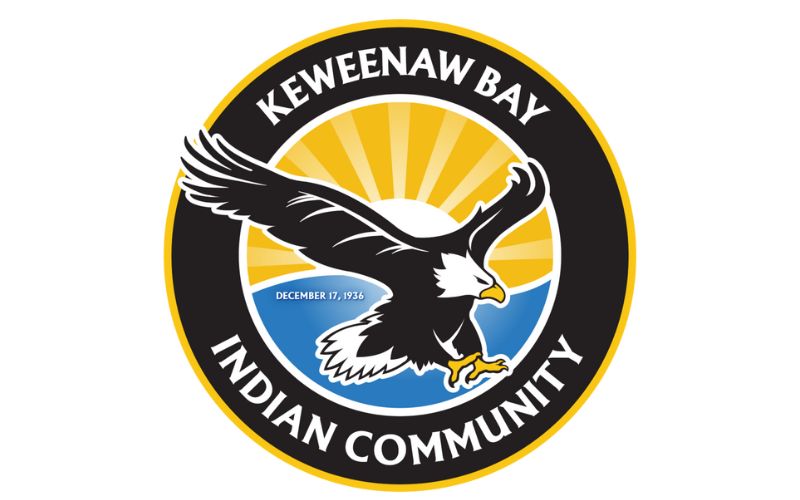
- Details
- By Native News Online Staff
A Michigan Indian Community is taking back ownership of close to 1,000 acres of stolen land with the help of global environmental nonprofit, The Nature Conservancy.
The tribe, the Keweenaw Bay Indian Community (KBIC) of the Lake Superior Band of Chippewa Indians, made the announcement on June 12. KBIC is a federally recognized Tribe will a primary land base of close to 60,000 acres, the L’Anse Indian Reservation. The tribe serves about 3,500 enrolled members in Baraga, Ontonagon, Gogebic, Marquette, Houghton and Keweenaw Counties.
The 760 acres of forest land in Baraga County was originally part of KBIC’s 1842 reservation boundaries, according to the tribe. The Nature Conservancy purchased the land in 2021 from a local owner, and officially transferred the deed back to the tribe at a tribal council meeting on Wednesday.
Evelyn Ravindran, the Natural Resources Director for KBIC, said that the tribe is dedicated to the long-term protection of natural resources, healthy ecosystems, and preservation of traditions for the generations to come.
“We recognize the importance of working together with like-minded co-stewards to achieve goals across man-made boundaries and look to developing and strengthening partnerships to realize our vision,” Ravindran said in a press release. “Over the years, TNC has welcomed KBIC’s input and involvement in the Keweenaw Heartlands Project and has expressed interest in other collaborations including wildlife monitoring and wild rice restoration.”
Helen Taylor, state director for The Nature Conservancy in Michigan, called the land transfer “vital” for supporting Indigenous and local communities.
“We are honored to make this contribution to KBIC’s future success by transferring this land to them,” said Taylor. “KBIC members have been stewards of the land for generations, and their cultural teachings signify and honor the connection between people, wildlife, and the natural world around us. “
More Stories Like This
50 Years of Self-Determination: How a Landmark Act Empowered Tribal Sovereignty and Transformed Federal-Tribal RelationsSault Ste. Marie Tribe Voters Show Strong Support for 3-Branch Government in Advisory Poll
Mashantucket Pequot Tribal Nation to Host Puneesuwak “Honoring” Our Veterans Event
Lumbee Recognition Debate Rekindled in Senate Hearing
Senate Committee on Indian Affairs to Hear Testimony on Lumbee Tribe Federal Recognition Bill
Help us tell the stories that could save Native languages and food traditions
At a critical moment for Indian Country, Native News Online is embarking on our most ambitious reporting project yet: "Cultivating Culture," a three-year investigation into two forces shaping Native community survival—food sovereignty and language revitalization.
The devastating impact of COVID-19 accelerated the loss of Native elders and with them, irreplaceable cultural knowledge. Yet across tribal communities, innovative leaders are fighting back, reclaiming traditional food systems and breathing new life into Native languages. These aren't just cultural preservation efforts—they're powerful pathways to community health, healing, and resilience.
Our dedicated reporting team will spend three years documenting these stories through on-the-ground reporting in 18 tribal communities, producing over 200 in-depth stories, 18 podcast episodes, and multimedia content that amplifies Indigenous voices. We'll show policymakers, funders, and allies how cultural restoration directly impacts physical and mental wellness while celebrating successful models of sovereignty and self-determination.
This isn't corporate media parachuting into Indian Country for a quick story. This is sustained, relationship-based journalism by Native reporters who understand these communities. It's "Warrior Journalism"—fearless reporting that serves the 5.5 million readers who depend on us for news that mainstream media often ignores.
We need your help right now. While we've secured partial funding, we're still $450,000 short of our three-year budget. Our immediate goal is $25,000 this month to keep this critical work moving forward—funding reporter salaries, travel to remote communities, photography, and the deep reporting these stories deserve.
Every dollar directly supports Indigenous journalists telling Indigenous stories. Whether it's $5 or $50, your contribution ensures these vital narratives of resilience, innovation, and hope don't disappear into silence.
 The stakes couldn't be higher. Native languages are being lost at an alarming rate. Food insecurity plagues many tribal communities. But solutions are emerging, and these stories need to be told.
The stakes couldn't be higher. Native languages are being lost at an alarming rate. Food insecurity plagues many tribal communities. But solutions are emerging, and these stories need to be told.
Support independent Native journalism. Fund the stories that matter.
Levi Rickert (Potawatomi), Editor & Publisher

